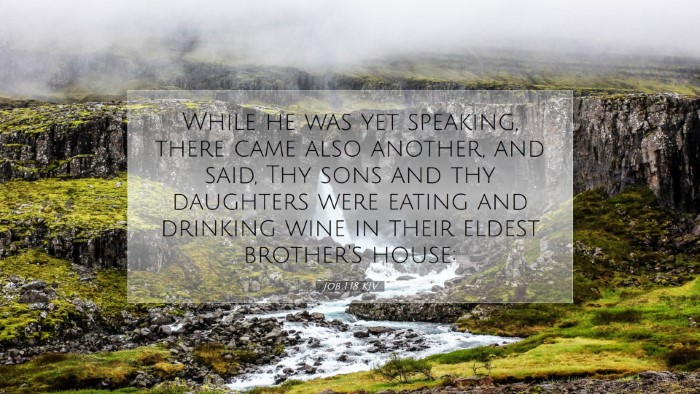Old Testament
Genesis Exodus Leviticus Numbers Deuteronomy Joshua Judges Ruth 1 Samuel 2 Samuel 1 Kings 2 Kings 1 Chronicles 2 Chronicles Ezra Nehemiah Esther Job Psalms Proverbs Ecclesiastes Song of Solomon Isaiah Jeremiah Lamentations Ezekiel Daniel Hosea Joel Amos Obadiah Jonah Micah Nahum Habakkuk Zephaniah Haggai Zechariah MalachiJob 1:18
Job 1:18 KJV
While he was yet speaking, there came also another, and said, Thy sons and thy daughters were eating and drinking wine in their eldest brother's house:
Job 1:18 Bible Commentary
Commentary on Job 1:18
Verse Reference: Job 1:18
“While he was yet speaking, there came also another, and said, Thy sons and thy daughters were eating and drinking wine in their eldest brother's house:”
Contextual Overview
Job 1 serves as the introduction to the character of Job, a man of great integrity and righteousness. This verse occurs amidst a series of calamities that befall Job, illustrating the depth of his suffering and the suddenness of his trials. The loss of his children is particularly poignant, capturing the catastrophic impact of the tragedies he faces.
Insights from Public Domain Commentaries
Matthew Henry's Commentary
Matthew Henry highlights that the calamity faced by Job is multifaceted, involving the loss of property, servants, and, most gravely, his children. In verse 18, the urgency and grief of the news are emphasized through the repetition of “while he was yet speaking.” Each messenger bears tidings of devastation, suggesting a compounding effect of Job's suffering, which characterizes the nature of life’s trials.
Henry points out that the children of Job were engaged in a social gathering—a normal, joyful occasion—which starkly contrasts with the tragedy that follows. This serves as a reminder of the fragility of life and the unpredictability of worldly happiness. Job's response to these losses is one of profound mourning but also an acknowledgment of God's sovereignty (Job 1:21).
Albert Barnes' Notes
Albert Barnes comments on the significance of the gathering of Job's children, noting that feasting and joy are a part of familial bonds. The sudden interruption of this joy by disaster underscores the reality of suffering in the human experience. Barnes reflects on how God allowed these events to occur, pointing to the divine permission that led to Job’s trials.
He also discusses the cultural significance of the children eating and drinking, in that their actions reflect a traditional celebration, likely marking a significant event or moment of familial unity. The subsequent devastation serves as a harsh reminder of both the unpredictability of life and the sovereignty of God over human affairs.
Adam Clarke's Commentary
Adam Clarke delves into the narrative with an emphasis on the timing of the calamities, remarking on the dramatic literary style of the passage. The phrase “while he was yet speaking” reinforces the rapid succession of disasters, highlighting the urgency and intensity of the grief that Job experiences. Clarke notes that this verse exemplifies a well-known literary technique in ancient narratives to heighten emotional responses.
Clarke also draws attention to Job’s social circumstances, indicating that his children likely enjoyed their life in a way that was socially acceptable at the time. Their activities serve as a stark contrast to the incoming disaster, aligning with classical themes in literature of the ephemeral nature of joy and earthly pleasures.
Theological Implications
In reflecting on Job 1:18 and the commentaries, several theological implications arise:
- The Sovereignty of God: The events parallel the discussions on divine sovereignty, particularly in the context of suffering. God's allowance of tragedy can lead to questions of faith, but it also highlights His ultimate authority over life.
- The Nature of Suffering: Job’s situation challenges the simplistic moral frameworks that equate suffering directly with sin. Job is described as blameless; therefore, this narrative prompts deeper reflections on the purpose of suffering and the mystery of God’s plans.
- The Reality of Grief: The death of Job’s children underscores a theme prevalent throughout scripture: the reality of grief is inherent to the human experience. Job's response serves as a model of mourning that acknowledges both sorrow and reverence before God.
Pastoral Applications
For pastors and church leaders, several lessons can be gleaned from Job 1:18:
- Compassion in Suffering: Pastors should be equipped to offer support and compassion to those experiencing loss, recognizing the profound depth of pain exhibited in Job's story.
- Understanding Divine Sovereignty: Teaching on God's sovereignty during times of suffering can provide comfort, emphasizing that God remains in control even amidst chaos.
- Encouraging Community: Highlighting the importance of community and gathering during shared times of joy and sorrow reflects how interconnected our lives are, as evidenced by Job's family dynamics.
Conclusion
Job 1:18 stands not only as a testament to one man’s unique suffering but also as an encapsulation of profound theological truths about human life, suffering, and divine oversight. By engaging with the insights provided by Matthew Henry, Albert Barnes, and Adam Clarke, we gain a holistic understanding of the text that serves both scholars and practitioners alike. This verse serves as an invitation to reflect on our own responses to unexpected trials and the nature of our faith during times of distress.


